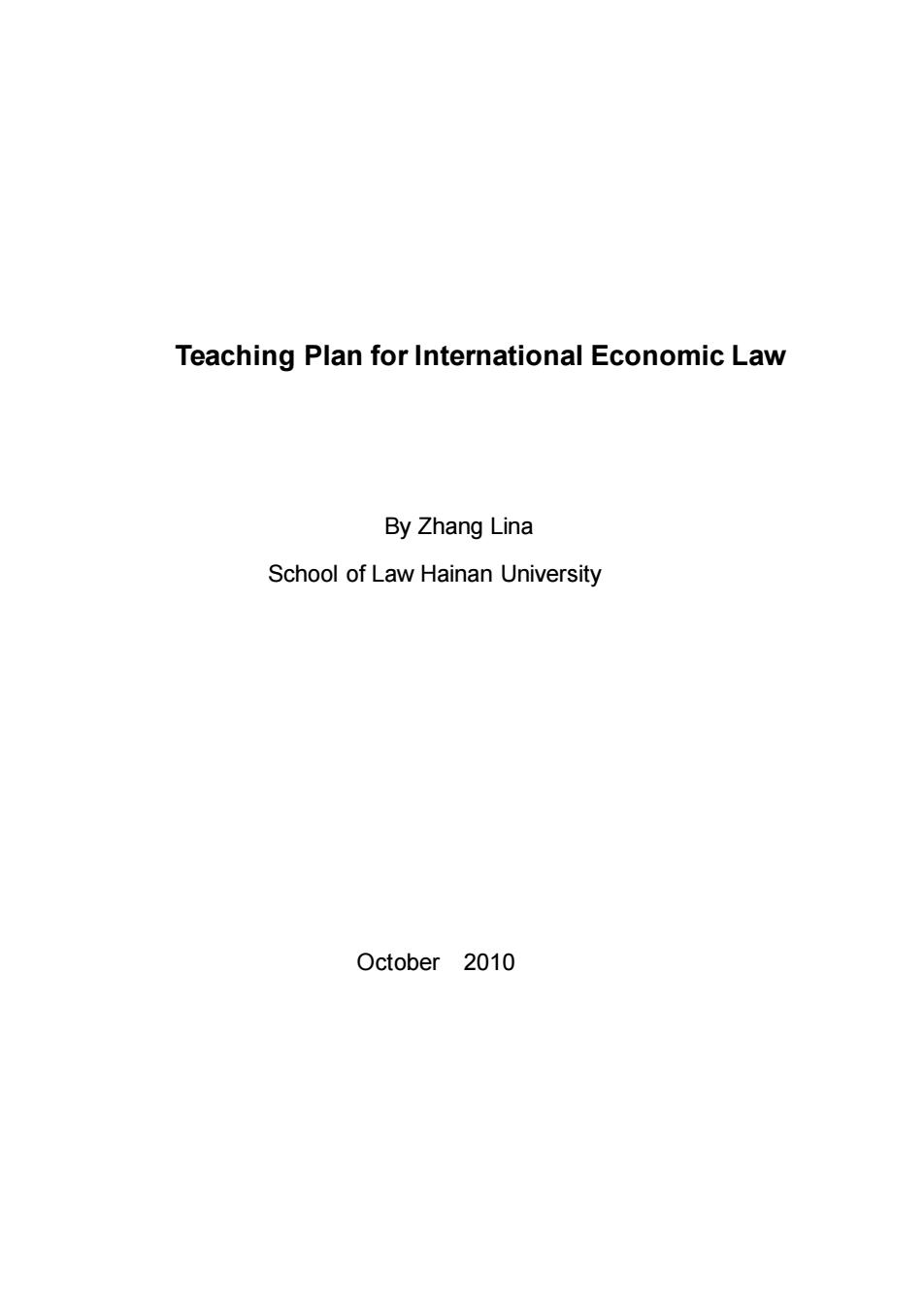
Teaching Plan for International Economic Law By Zhang Lina School of Law Hainan University October 2010
Teaching Plan for International Economic Law By Zhang Lina School of Law Hainan University October 2010
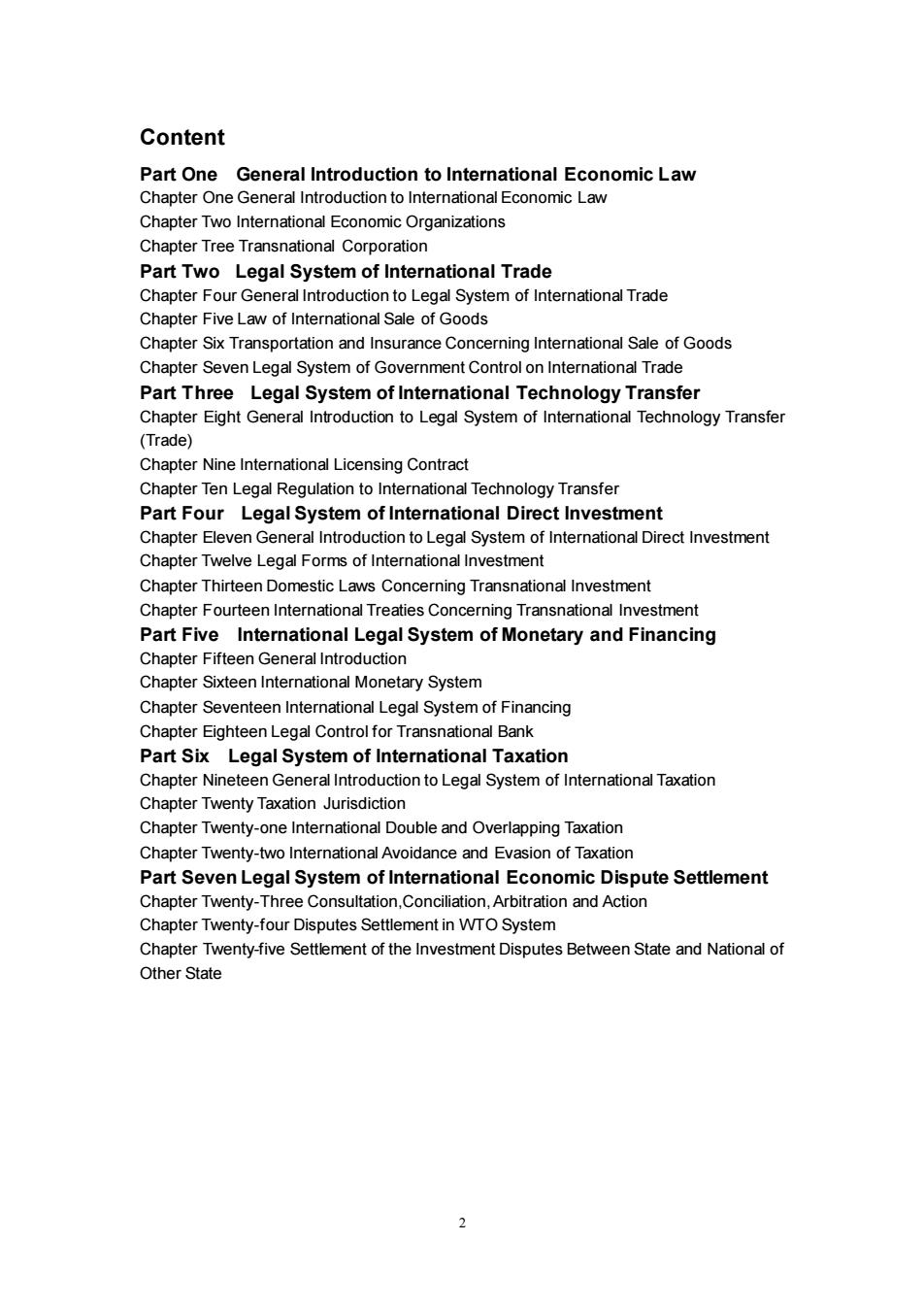
Content Part One General Introduction to International Economic Law Chapter One General Introduction to International Economic Law Chapter Two International Economic Organizations Chapter Tree Transnational Corporation Part Two Legal System of International Trade Chapter Four Gener ion to Legal System of International Trade Chapter Five Law of International Sale of Goods Chapter Six Transportation and Insurance Concerning International Sale of Goods Chapter Seven Legal System of Government Control on International Trade Part Three Legal System of International Technology Transfer Chapter Eight General Inroduction to Legal System of International Technology Transfer (Trade) Chapter Nine International Licensing Contract Chapter Ten Legal Regulation to International Technology Transfer Part Four Legal System of International Direct Investment Chapter Elev ren Gener】 alDirect Investment Chapter Thirteen Domestic Laws Concerning Transnational Investment Chapter Fourteen International Treaties Concerning Transnational Investment Part Five International Legal System of Monetary and Financing Chapter Sixteen Inter al Monetary System Chapter Seventeen International Legal System of Financing Chapter Eighteen Legal Control for Transnational Bank Part Six Legal System of International Taxation Chapter nineteen general Introduction to legal system of International taxation Chapter Twenty Taxation Juri isdiction Chapter Twenty-one International Double and Overlapping Taxation Chapter Twenty-two International Avoidance and Evasion of Taxation Part Seven Legal System of International Economic Dispute Settlement Chapter Twenty-Three consultation Conciliation.Arbitration and Action Chapter Twenty-four Disputes Settlement in WTO System Chapter Twenty-five Settlement of the Investment Disputes Between State and National of Other State
2 Content Part One General Introduction to International Economic Law Chapter One General Introduction to International Economic Law Chapter Two International Economic Organizations Chapter Tree Transnational Corporation Part Two Legal System of International Trade Chapter Four General Introduction to Legal System of International Trade Chapter Five Law of International Sale of Goods Chapter Six Transportation and Insurance Concerning International Sale of Goods Chapter Seven Legal System of Government Control on International Trade Part Three Legal System of International Technology Transfer Chapter Eight General Introduction to Legal System of International Technology Transfer (Trade) Chapter Nine International Licensing Contract Chapter Ten Legal Regulation to International Technology Transfer Part Four Legal System of International Direct Investment Chapter Eleven General Introduction to Legal System of International Direct Investment Chapter Twelve Legal Forms of International Investment Chapter Thirteen Domestic Laws Concerning Transnational Investment Chapter Fourteen International Treaties Concerning Transnational Investment Part Five International Legal System of Monetary and Financing Chapter Fifteen General Introduction Chapter Sixteen International Monetary System Chapter Seventeen International Legal System of Financing Chapter Eighteen Legal Control for Transnational Bank Part Six Legal System of International Taxation Chapter Nineteen General Introduction to Legal System of International Taxation Chapter Twenty Taxation Jurisdiction Chapter Twenty-one International Double and Overlapping Taxation Chapter Twenty-two International Avoidance and Evasion of Taxation Part Seven Legal System of International Economic Dispute Settlement Chapter Twenty-Three Consultation,Conciliation, Arbitration and Action Chapter Twenty-four Disputes Settlement in WTO System Chapter Twenty-five Settlement of the Investment Disputes Between State and National of Other State
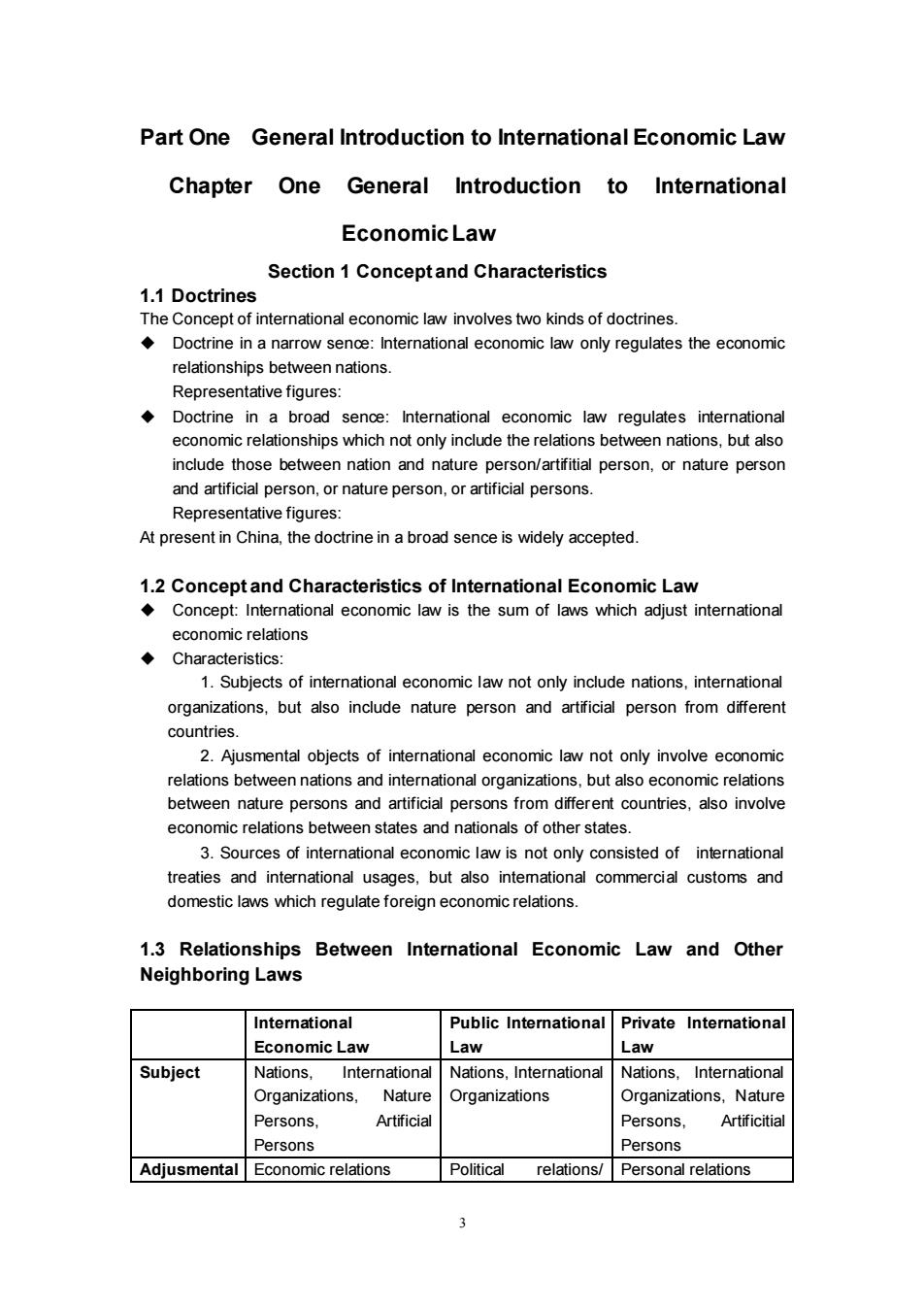
Part One General Introduction to International Economic Law Chapter One General Introduction to International Economic Law Section 1 Conceptand Characteristics 1.1 Doctrines The Concept of international economic law involves two kinds of doctrines Doctrine in a narrow sence:International economic law only regulates the economic relationships between nations. Representative figures: ◆ Doctrine in a broad sence Inte economic relationships which not only include the relations between nations,but als include those between nation and nature person/artifitial person,or nature person and artificial person,or nature person,or artificial persons. Representative figures: At present in China,the doctrine in a broad sence is widely accepted. 1.2 Concept and Characteristics of International Economic Law Concept:International economic law is the sum of laws which adjust international economic relations ◆Characteristics: 1.Subjects of international eco omic law not ony include nations,interationl organizations.but also include nature person and artificial person from different countries. 2.Ajusmental objects of international economic law not only involve economic relations between nations and international organizations.but also economic relations between nature persons and artificial persons from different countries.also involve economic relat ns between states and natic hals of other states 3.Sources of international economic law is not only consisted of international treaties and international usages,but also intemational commercial customs and domestic laws which requlate foreign economic relations. 1.3 Relationships Between International Economic Law and Other Neighboring Laws International Public International Private Intemational Economic Law I aw Law Subject Nations ational ations,International tions. International Organizations, Nature Organizations,Nature Persons. Artificia Persons. Artificitia Persons Persons Adjusmental Economic relations Political relations/Personal relations
3 Part One General Introduction to International Economic Law Chapter One General Introduction to International Economic Law Section 1 Concept and Characteristics 1.1 Doctrines The Concept of international economic law involves two kinds of doctrines. ◆ Doctrine in a narrow sence: International economic law only regulates the economic relationships between nations. Representative figures: ◆ Doctrine in a broad sence: International economic law regulates international economic relationships which not only include the relations between nations, but also include those between nation and nature person/artifitial person, or nature person and artificial person, or nature person, or artificial persons. Representative figures: At present in China, the doctrine in a broad sence is widely accepted. 1.2 Concept and Characteristics of International Economic Law ◆ Concept: International economic law is the sum of laws which adjust international economic relations ◆ Characteristics: 1. Subjects of international economic law not only include nations, international organizations, but also include nature person and artificial person from different countries. 2. Ajusmental objects of international economic law not only involve economic relations between nations and international organizations, but also economic relations between nature persons and artificial persons from different countries, also involve economic relations between states and nationals of other states. 3. Sources of international economic law is not only consisted of international treaties and international usages, but also international commercial customs and domestic laws which regulate foreign economic relations. 1.3 Relationships Between International Economic Law and Other Neighboring Laws International Economic Law Public International Law Private International Law Subject Nations, International Organizations, Nature Persons, Artificial Persons Nations, International Organizations Nations, International Organizations, Nature Persons, Artificitial Persons Adjusmental Economic relations Political relations/ Personal relations
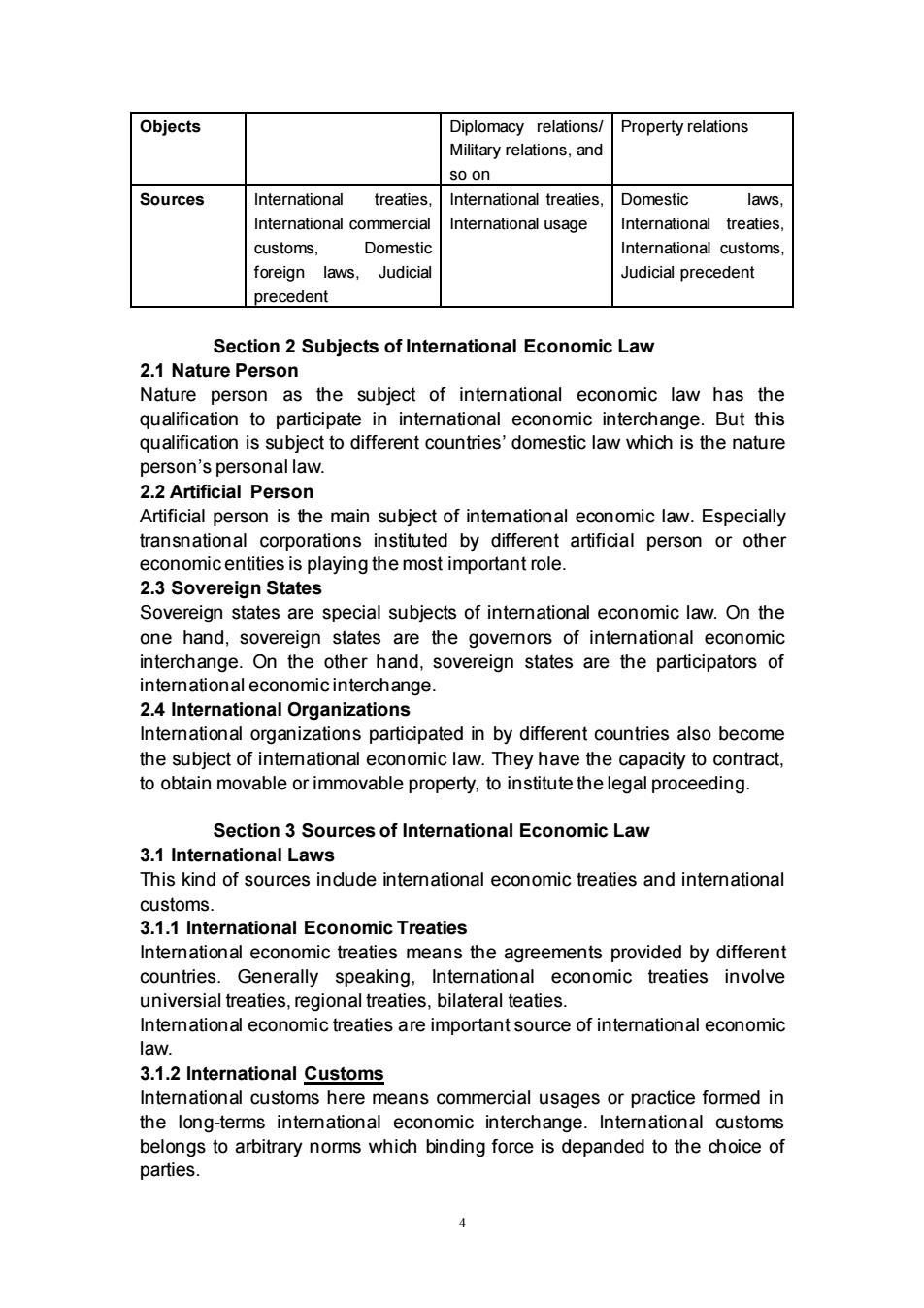
Objects Diplomacy relations/Property relations Military relations.n so on Sources International treaties. International treaties. Domestic laws International commercial International usage I International treaties customs, Domesti International customs foreign laws udicial precedent precedent Section 2 Subjects of International Economic Law 2.1 Nature Person Nature person as the subject of intemnational economic law has the qualification to participate in interational economic interchange.But this qualification is subject to different countries'domestic law which is the nature person's personallaw 22 Artificial Person Artificial per on is the main subject of intemational economic law.Especially transnational corporations instituted by different artificial person or other economic entities is playing the most important role. 2.3 Sovereign States Sovereign states are special subjects of intemational economic law.On the one hand, ereign state are the govemors of intemational economi interchange.On the other hand,sovereign states are the participators of intemational economic interchange. 2.4 International Organizations Intemational organizations participated in by different countries also become the subject of intemational economic law.They have the capacity to contract. to obtain movable or immovable property,to institute the legal proceeding. Section 3 Sources of International Economic Law 3.1 International Laws This kind of sources incude intemational economic treaties and intemational Intemational economic treaties means the agreements provided by different countries.Generally speaking,Intemational economic treaties involve universial treaties.regional treaties.bilateral teaties. mic treaties are important source of intemational economic 3.1.2 International Customs Intemnational customs here means commercial usages or practice formed in the long-terms international economic interchange.Intemational customs belongs to arbitrary norms which binding force is depanded to the choice of parties
4 Objects Diplomacy relations/ Military relations, and so on Property relations Sources International treaties, International commercial customs, Domestic foreign laws, Judicial precedent International treaties, International usage Domestic laws, International treaties, International customs, Judicial precedent Section 2 Subjects of International Economic Law 2.1 Nature Person Nature person as the subject of international economic law has the qualification to participate in international economic interchange. But this qualification is subject to different countries’ domestic law which is the nature person’s personal law. 2.2 Artificial Person Artificial person is the main subject of international economic law. Especially transnational corporations instituted by different artificial person or other economic entities is playing the most important role. 2.3 Sovereign States Sovereign states are special subjects of international economic law. On the one hand, sovereign states are the governors of international economic interchange. On the other hand, sovereign states are the participators of international economic interchange. 2.4 International Organizations International organizations participated in by different countries also become the subject of international economic law. They have the capacity to contract, to obtain movable or immovable property, to institute the legal proceeding. Section 3 Sources of International Economic Law 3.1 International Laws This kind of sources include international economic treaties and international customs. 3.1.1 International Economic Treaties International economic treaties means the agreements provided by different countries. Generally speaking, International economic treaties involve universial treaties, regional treaties, bilateral teaties. International economic treaties are important source of international economic law. 3.1.2 International Customs International customs here means commercial usages or practice formed in the long-terms international economic interchange. International customs belongs to arbitrary norms which binding force is depanded to the choice of parties
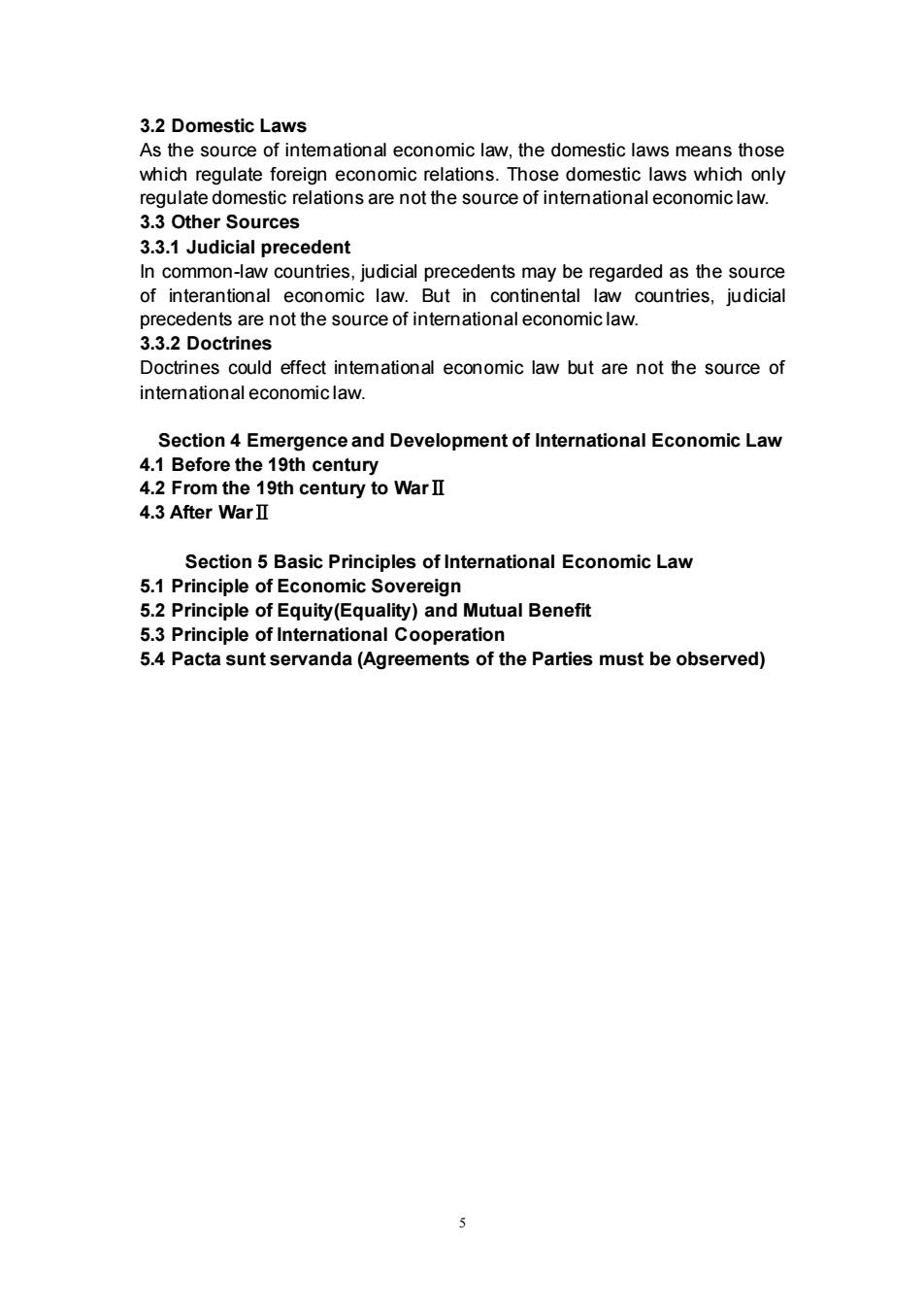
3.2 Domestic Laws As the source of intemational economic law,the domestic laws means those whichregulate foreign economic relations.Those domestic laws which only regulate domestic relations are not the source of intemational economic law. 3.3 Other Sources 3.3.1 Judicial precedent In common-law countries,judicial precedents may be regarded as the source of interantional conomic law. But in continental countries,judicia precedents are not the source of intemational economic law 3.3.2 Doctrines Doctrines could effect intemational economic law but are not the source of intemational economiclaw. Section 4 Er ergence and Development of International Economic Law 4.1 Before the 19th century 4.2 From the 19th century to WarII 4.3 After WarⅡ Section 5 Basic Principles of International Economic Law 5.1 Principle of Economic Sovereign 5.2 Principle of Equity(Equality)and Mutual Benefit 5.3 Principle of International Cooperation 5.4 Pacta sunt servanda(Agreements of the Parties must be observed)
5 3.2 Domestic Laws As the source of international economic law, the domestic laws means those which regulate foreign economic relations. Those domestic laws which only regulate domestic relations are not the source of international economic law. 3.3 Other Sources 3.3.1 Judicial precedent In common-law countries, judicial precedents may be regarded as the source of interantional economic law. But in continental law countries, judicial precedents are not the source of international economic law. 3.3.2 Doctrines Doctrines could effect international economic law but are not the source of international economic law. Section 4 Emergence and Development of International Economic Law 4.1 Before the 19th century 4.2 From the 19th century to WarⅡ 4.3 After WarⅡ Section 5 Basic Principles of International Economic Law 5.1 Principle of Economic Sovereign 5.2 Principle of Equity(Equality) and Mutual Benefit 5.3 Principle of International Cooperation 5.4 Pacta sunt servanda (Agreements of the Parties must be observed)
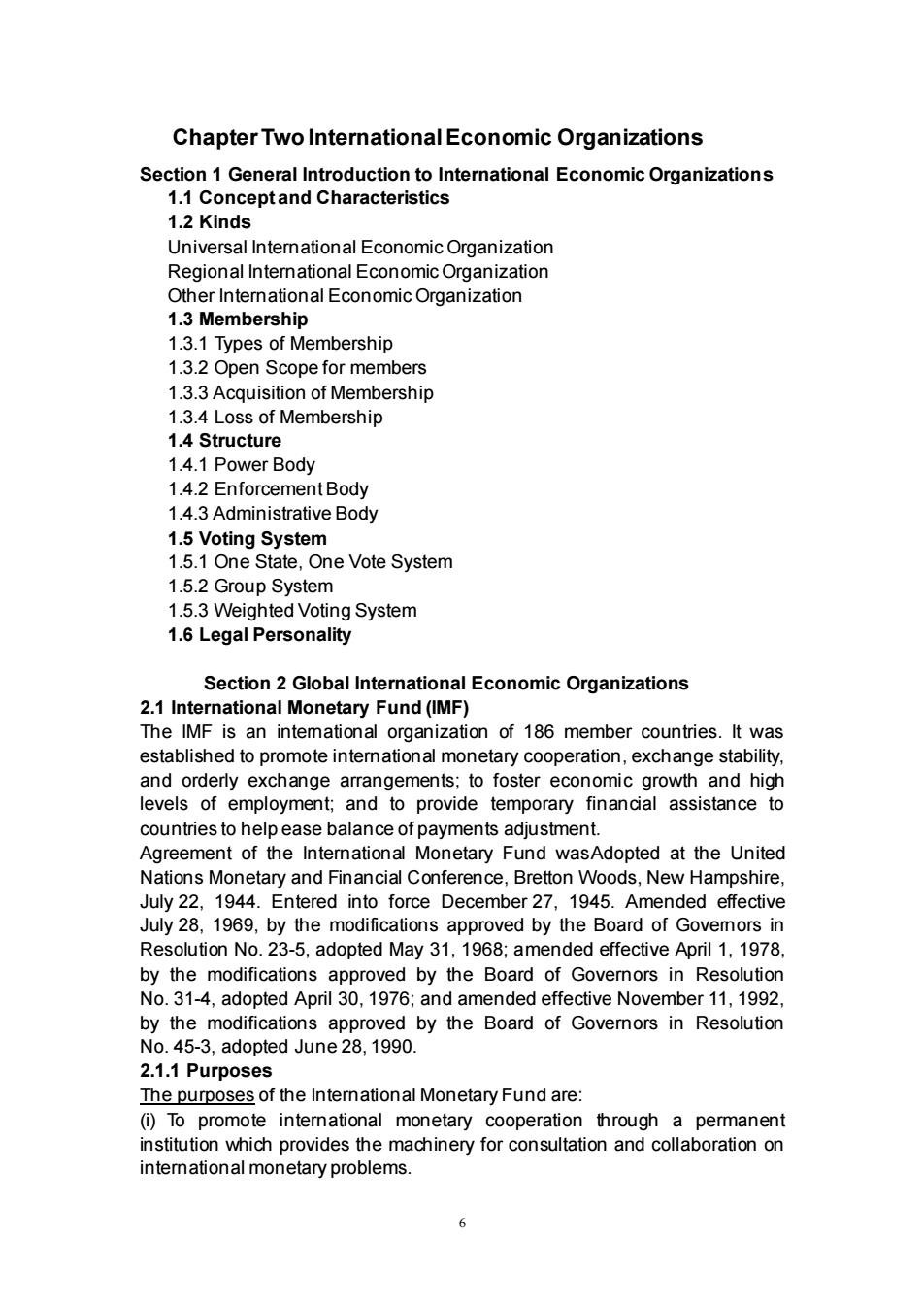
Chapter Two International Economic Organizations Section 1 General Introduction to International Economic Organizations 1.1 Conceptand Characteristics 1.2 Kinds Universal Intemnational Economic Organization Re Other International Economic Organization 1.3 Membership 1.3.1 Types of Membership 1.3.2 Open Scope for members 1.3.3 Acquisition of Membership 1.3.4 Loss of Membership 1.4 Structure 1.4.1 Power Body 1.4.2 Enforcement Body 1.4.3 Administrative Body 1.5 Votin g System 1.5.1 One State,One Vote System 1.5.2 Group System 1.5.3 Weighted Voting System 1.6 Legal Personality Section 2 Global International Economic Organizations 2.1 International Monetary Fund(IMF) The IMF is an intemational organization of 186 member countries.It was established to promote intemational monetary cooperation,exchange stability. and orderly levels of exchange arrangements:to foster economic growth and high employme and to provide temporary ncal assistance to countries to help ease balance of payments adjustment Agreement of the International Monetary Fund wasAdopted at the United Nations Monetary and Financial Conference,Bretton Woods,New Hampshire, July 22.1944.Entered into force December 27.1945.Amended effective luly 28 1969 by the modifications approved by the Board of Govemors in Resolution No.23-5,adopted May 31.1968;amended effective April 1.1978 by the modifications approved by the Board of Governors in Resolution No.31-4,adopted April 30,1976;and amended effective November 11,1992, by the modifications approved by the Board of Governors in Resolution No.45-3.adopted June 28.1990. 2.1.1 Purposes The purposes of the International Monetary Fund are: (i)To promote intemnational monetary cooperation through a permanent institution which provides the machinery for consultation and collaboration on international monetary problems. 6
6 Chapter Two International Economic Organizations Section 1 General Introduction to International Economic Organizations 1.1 Concept and Characteristics 1.2 Kinds Universal International Economic Organization Regional International Economic Organization Other International Economic Organization 1.3 Membership 1.3.1 Types of Membership 1.3.2 Open Scope for members 1.3.3 Acquisition of Membership 1.3.4 Loss of Membership 1.4 Structure 1.4.1 Power Body 1.4.2 Enforcement Body 1.4.3 Administrative Body 1.5 Voting System 1.5.1 One State, One Vote System 1.5.2 Group System 1.5.3 Weighted Voting System 1.6 Legal Personality Section 2 Global International Economic Organizations 2.1 International Monetary Fund (IMF) The IMF is an international organization of 186 member countries. It was established to promote international monetary cooperation, exchange stability, and orderly exchange arrangements; to foster economic growth and high levels of employment; and to provide temporary financial assistance to countries to help ease balance of payments adjustment. Agreement of the International Monetary Fund wasAdopted at the United Nations Monetary and Financial Conference, Bretton Woods, New Hampshire, July 22, 1944. Entered into force December 27, 1945. Amended effective July 28, 1969, by the modifications approved by the Board of Governors in Resolution No. 23-5, adopted May 31, 1968; amended effective April 1, 1978, by the modifications approved by the Board of Governors in Resolution No. 31-4, adopted April 30, 1976; and amended effective November 11, 1992, by the modifications approved by the Board of Governors in Resolution No. 45-3, adopted June 28, 1990. 2.1.1 Purposes The purposes of the International Monetary Fund are: (i) To promote international monetary cooperation through a permanent institution which provides the machinery for consultation and collaboration on international monetary problems
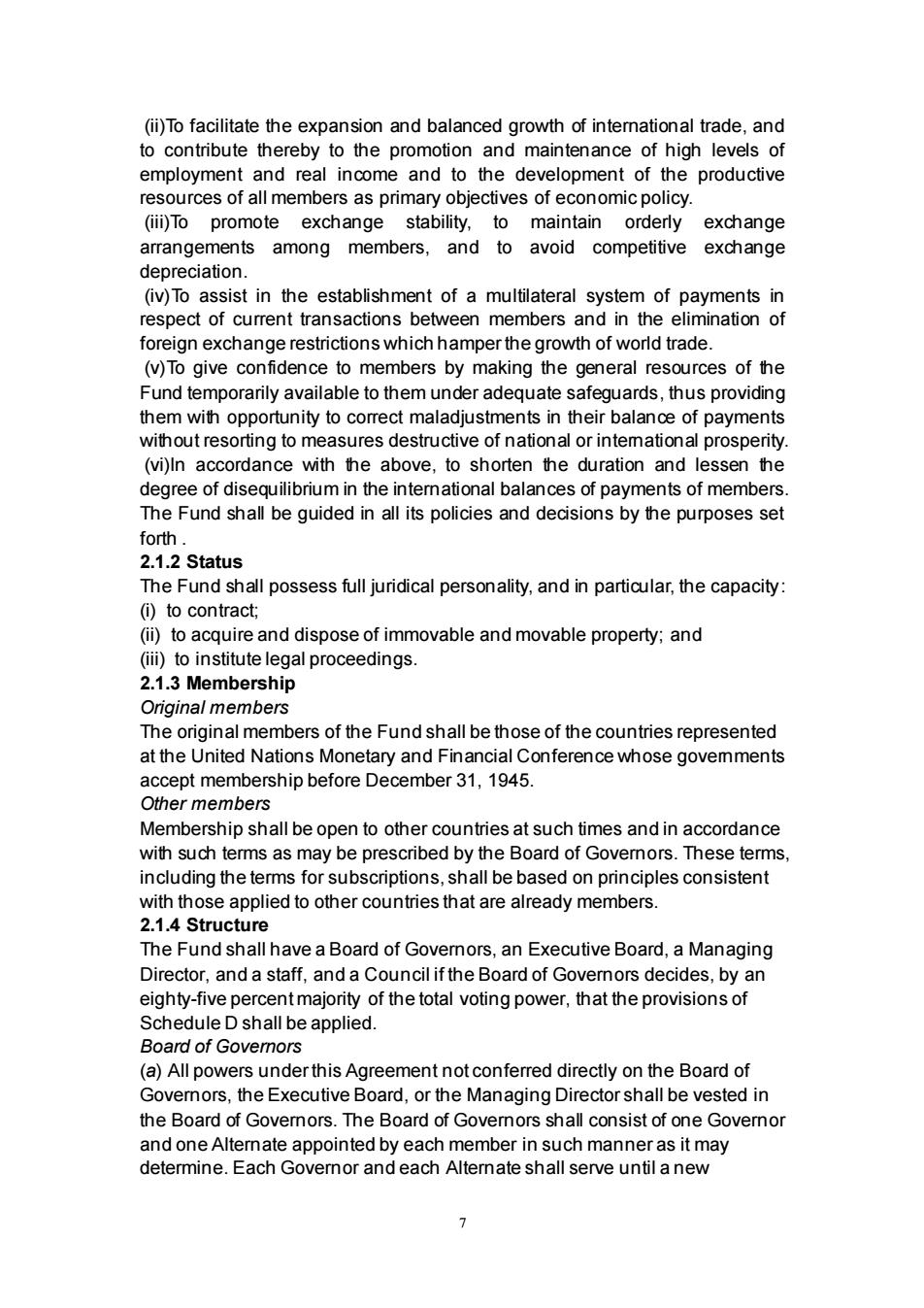
(ii)To facilitate the expansion and balanced arowth of intemational trade.and to contribute thereby to the promotion and maintenance of high levels of employment and real incom and to the development of the productive resources of all members as primary objectives of economic policy. (iii)To promote exchange stability,to maintain orderly exchange arrangements amona members.and to avoid competitive exchange depreciation (iv)To establishment of a mulilateral system of payme foreign exchange restrictions which hamper the growth of world trade. (v)To give confidence to members by making the general resources of the Fund temporarily available to them under adequate safeguards,thus providing with opportun nity to comre aladjustments in their balar payment intemati (vi)In accordance with the above,to shorten the duration and lessen the degree of disequilibrium in the intemational balances of payments of members. The Fund shall be guided in all its policies and decisions by the purposes set forth 2.1.2 Status The Fund shall possess full juridical personality,and in particular,the capacity: (i)to contract (ii)to acquire and dispose of immovable and movable property;and (iii)to institute legal proceedings. 2.1.3M mber Original members The original members of the Fund shall be those of the countries represented at the United Nations Monetary and Financial Conference whose govemments mbership before December 31.1945. mbers embership shall be open to other countries at such times and in accordance with such terms as may be prescribed by the Board of Governors.These terms including the terms for subscriptions,shall be based on principles consistent with those applied to other countries that are already members. 2.1.4 Structure The Fund shall have a Board of Govemnors,an Executive Board,a Managing Director,and a staff,and a Council if the Board of Govemors decides,by an eighty-five percent majority of the total voting power,that the provisions of Schedule D shall be applied. Board of govemors Govemors,the Executive Board,or the Managing Director shall be vested in the Board of Govemors.The Board of Govemors shall consist of one Govemor and one Altemate appointed by each member in such manner as it may determine.Each Govemor and each Altemate shall serve until a new >
7 (ii)To facilitate the expansion and balanced growth of international trade, and to contribute thereby to the promotion and maintenance of high levels of employment and real income and to the development of the productive resources of all members as primary objectives of economic policy. (iii)To promote exchange stability, to maintain orderly exchange arrangements among members, and to avoid competitive exchange depreciation. (iv)To assist in the establishment of a multilateral system of payments in respect of current transactions between members and in the elimination of foreign exchange restrictions which hamper the growth of world trade. (v)To give confidence to members by making the general resources of the Fund temporarily available to them under adequate safeguards, thus providing them with opportunity to correct maladjustments in their balance of payments without resorting to measures destructive of national or international prosperity. (vi)In accordance with the above, to shorten the duration and lessen the degree of disequilibrium in the international balances of payments of members. The Fund shall be guided in all its policies and decisions by the purposes set forth . 2.1.2 Status The Fund shall possess full juridical personality, and in particular, the capacity: (i) to contract; (ii) to acquire and dispose of immovable and movable property; and (iii) to institute legal proceedings. 2.1.3 Membership Original members The original members of the Fund shall be those of the countries represented at the United Nations Monetary and Financial Conference whose governments accept membership before December 31, 1945. Other members Membership shall be open to other countries at such times and in accordance with such terms as may be prescribed by the Board of Governors. These terms, including the terms for subscriptions, shall be based on principles consistent with those applied to other countries that are already members. 2.1.4 Structure The Fund shall have a Board of Governors, an Executive Board, a Managing Director, and a staff, and a Council if the Board of Governors decides, by an eighty-five percent majority of the total voting power, that the provisions of Schedule D shall be applied. Board of Governors (a) All powers under this Agreement not conferred directly on the Board of Governors, the Executive Board, or the Managing Director shall be vested in the Board of Governors. The Board of Governors shall consist of one Governor and one Alternate appointed by each member in such manner as it may determine. Each Governor and each Alternate shall serve until a new
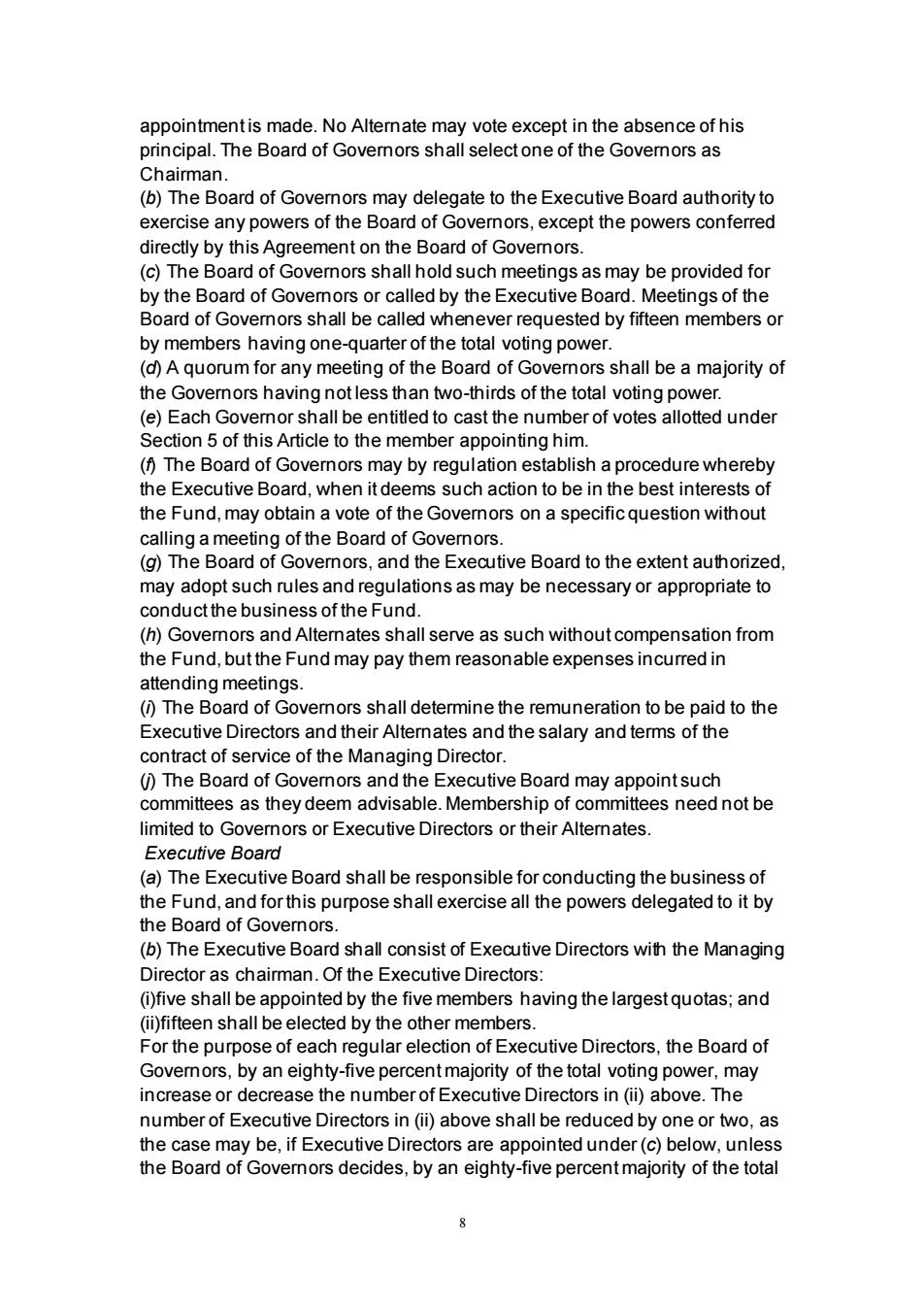
appointment is made.No Alternate may vote except in the absence of his principal.The Board of Govemors shall select one of the Govemors as Chairman (b)The Board of Govemors may delegate to the Executive Board authority to exercise any powers of the Board of Govemors,except the powers conferred directly by this Agreement on the Board of Govemnors. (c)The Board of Govemors shall hold suc meetings as ma called by the Executive Bo e provided for by the Board of Gove Meetings of the Board of Govemors shall be called whenever requested by fifteen members or by members having one-quarter of the total voting power (d)A quorum for any meeting of the Board of Governors shall be a maiority of the Gove os two-hrdsoftetotal voing power. (e)Each G hall be entitled to cast the num of votes allotted unde ection 5 of this Article to the member appointing him (fThe Board of Govemors may by regulation establish a procedure whereby the Executive Board,when it deems such action to be in the best interests of the Fund,may obtain a vote of the Govemors on a specific question without alling a of the Bo ard of Go R8eoadO8CoteneasradSe'ExeaneBoardoheexentauhotized may adopt such rules and requlations as may be necessary or appropriate to conduct the business of the Fund. (h)govemors and alternates shall serve as such without compensation from the Fund,but the Fund may pay them reasonable expenses incurred in attending meeti (i)The Board of Governors shall determine the remuneration to be paid to the Executive directors and their alternates and the salary and terms of the contract of service of the Managing Director. ()The Board of Govemnors and the Executive Board may appointsuch ommittees as they de n advisable.Memb rship of committees need not be limited to Govemors or Executive Directors or their Altemnates Executive Board (a)The Executive Board shall be responsible for conducting the business of the Fund,and for this purpose shall exercise all the powers delegated to it by (b)The Exe cutive Boar I shall consist of Executive Director with the Managing Director as chairman.Of the Executive Directors (i)five shall be appointed by the five members having the largest quotas;and (ii)fifteen shall be elected by the other members For the purpose of each regular election of Executive Directors,the Board of Govemors,by an eighty-five p majority of the total voting power may increase or decrease the number of Executive Directors in(ii)above.The number of Executive Directors in(ii)above shall be reduced by one or two,as the case may be,if Executive Directors are appointed under(c)below,unless the Board of Govemors decides,by an eighty-five percentmajority of the total
8 appointment is made. No Alternate may vote except in the absence of his principal. The Board of Governors shall select one of the Governors as Chairman. (b) The Board of Governors may delegate to the Executive Board authority to exercise any powers of the Board of Governors, except the powers conferred directly by this Agreement on the Board of Governors. (c) The Board of Governors shall hold such meetings as may be provided for by the Board of Governors or called by the Executive Board. Meetings of the Board of Governors shall be called whenever requested by fifteen members or by members having one-quarter of the total voting power. (d) A quorum for any meeting of the Board of Governors shall be a majority of the Governors having not less than two-thirds of the total voting power. (e) Each Governor shall be entitled to cast the number of votes allotted under Section 5 of this Article to the member appointing him. (f) The Board of Governors may by regulation establish a procedure whereby the Executive Board, when it deems such action to be in the best interests of the Fund, may obtain a vote of the Governors on a specific question without calling a meeting of the Board of Governors. (g) The Board of Governors, and the Executive Board to the extent authorized, may adopt such rules and regulations as may be necessary or appropriate to conduct the business of the Fund. (h) Governors and Alternates shall serve as such without compensation from the Fund, but the Fund may pay them reasonable expenses incurred in attending meetings. (i) The Board of Governors shall determine the remuneration to be paid to the Executive Directors and their Alternates and the salary and terms of the contract of service of the Managing Director. (j) The Board of Governors and the Executive Board may appoint such committees as they deem advisable. Membership of committees need not be limited to Governors or Executive Directors or their Alternates. Executive Board (a) The Executive Board shall be responsible for conducting the business of the Fund, and for this purpose shall exercise all the powers delegated to it by the Board of Governors. (b) The Executive Board shall consist of Executive Directors with the Managing Director as chairman. Of the Executive Directors: (i)five shall be appointed by the five members having the largest quotas; and (ii)fifteen shall be elected by the other members. For the purpose of each regular election of Executive Directors, the Board of Governors, by an eighty-five percent majority of the total voting power, may increase or decrease the number of Executive Directors in (ii) above. The number of Executive Directors in (ii) above shall be reduced by one or two, as the case may be, if Executive Directors are appointed under (c) below, unless the Board of Governors decides, by an eighty-five percent majority of the total
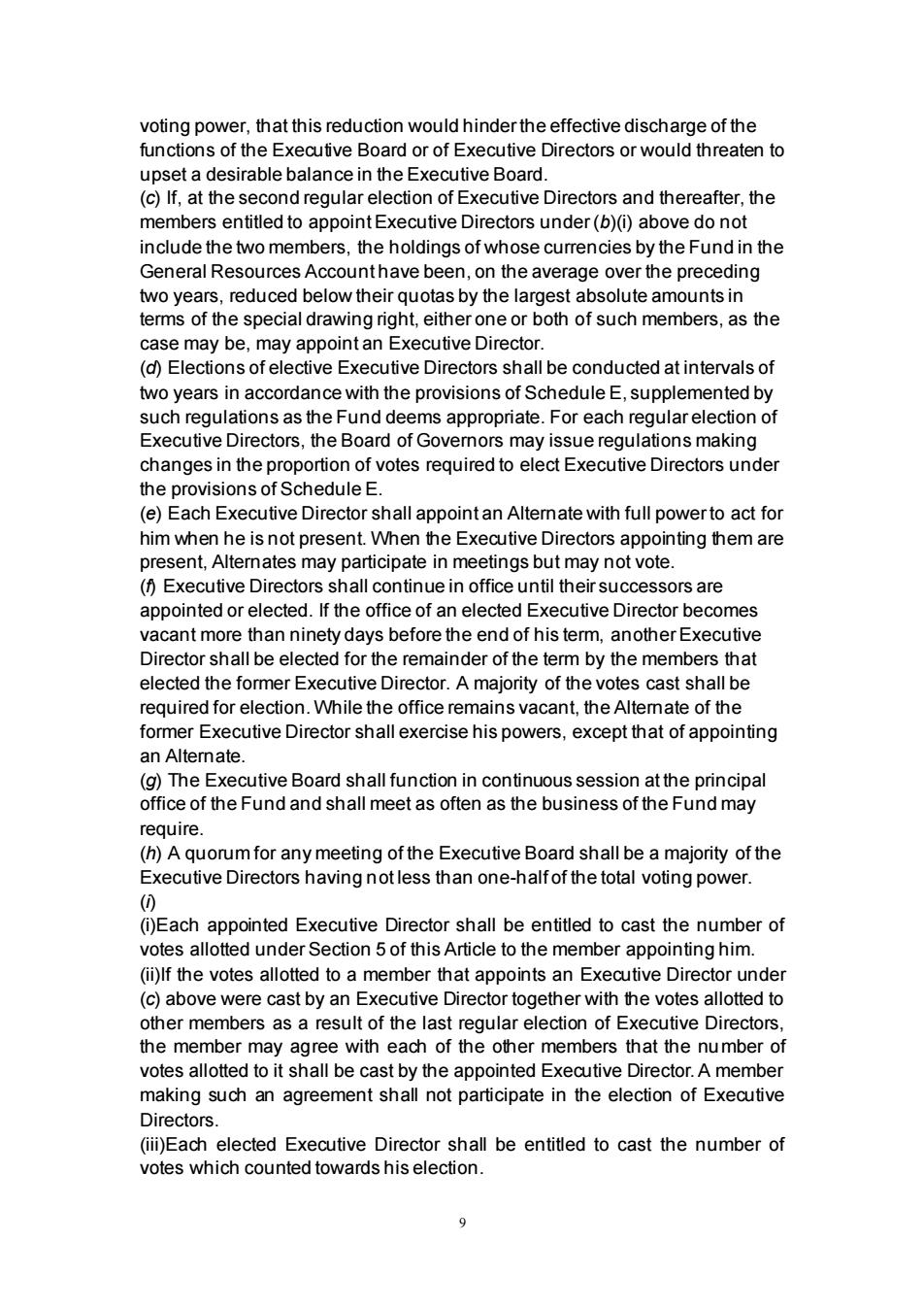
voting power,that this reduction would hinder the effective discharge of the functi ons of the Executive Board or of Executive Directors or would threaten to ups et a desirable balance in the Executive Board (c)If,at the second regular election of Executive Directors and thereafter,the members entitled to appoint Executive Directors under(b)(i)above do not include the two members,the holdings of whose currencies by the Fund in the General Resources Account have been,on the average over the preceding two yea ced helow w the tas by the la ge abs nts i terms of the special drawing right,either one or both of such members,as the case may be,may appoint an Executive Director. (d)Elections of elective executive directors shall be conducted at intervals of two years in accordance with the provisions of Schedule E.supplemented by uch reg ulations as the Fu ns appropna te.For eac election of may issue regula ons making changes in the proportion of votes required to elect Executive Directors under the provisions of Schedule E. (e)Each Executive Director shall appoint an Altemnate with full power to act for him when he is not present.When the Executive Directors ap pp ting them are ates may pa cip in me ings bu may not vote (f)Executive Directors shall continue in office until their successors are appointed or elected.If the office of an elected Executive Director becomes vacant more than ninety days before the end of his term,another Executive Director shall be elected for the remainder of the term by the members that elected the fo tor.A m jority of th cast shall be required for electi on.While the office remains vacant,the Altemate of the former Executive Director shall exercise his powers,except that of appointing an alternate (g)The Executive Board shall function in continuous session at the principal office of the Fund and shall meet as ofter n as the busin ess of the Fund may require (h)A quorum for any meeting of the Executive Board shall be a majority of the Executive Directors having not less than one-half of the total voting power. (i)Each appointed Executive Director shall be entitled to cast the number of votes allotte der in5of this Article to the member appoininghim. (ii)If the votes allotted to a member that appoints an Executive Director under (c)above were cast by an executive director together with the votes allotted to other members as a result of the last regular election of Executive Directors, the member may agree with each of the other members that the number of otes allotted to it s all be cast by the appointed Executive Director.A me he making such an agreement shal not participate in the election of Executive Directors. (iii)Each elected Executive Director shall be entitled to cast the number of votes which counted towards his election. 9
9 voting power, that this reduction would hinder the effective discharge of the functions of the Executive Board or of Executive Directors or would threaten to upset a desirable balance in the Executive Board. (c) If, at the second regular election of Executive Directors and thereafter, the members entitled to appoint Executive Directors under (b)(i) above do not include the two members, the holdings of whose currencies by the Fund in the General Resources Account have been, on the average over the preceding two years, reduced below their quotas by the largest absolute amounts in terms of the special drawing right, either one or both of such members, as the case may be, may appoint an Executive Director. (d) Elections of elective Executive Directors shall be conducted at intervals of two years in accordance with the provisions of Schedule E, supplemented by such regulations as the Fund deems appropriate. For each regular election of Executive Directors, the Board of Governors may issue regulations making changes in the proportion of votes required to elect Executive Directors under the provisions of Schedule E. (e) Each Executive Director shall appoint an Alternate with full power to act for him when he is not present. When the Executive Directors appointing them are present, Alternates may participate in meetings but may not vote. (f) Executive Directors shall continue in office until their successors are appointed or elected. If the office of an elected Executive Director becomes vacant more than ninety days before the end of his term, another Executive Director shall be elected for the remainder of the term by the members that elected the former Executive Director. A majority of the votes cast shall be required for election. While the office remains vacant, the Alternate of the former Executive Director shall exercise his powers, except that of appointing an Alternate. (g) The Executive Board shall function in continuous session at the principal office of the Fund and shall meet as often as the business of the Fund may require. (h) A quorum for any meeting of the Executive Board shall be a majority of the Executive Directors having not less than one-half of the total voting power. (i) (i)Each appointed Executive Director shall be entitled to cast the number of votes allotted under Section 5 of this Article to the member appointing him. (ii)If the votes allotted to a member that appoints an Executive Director under (c) above were cast by an Executive Director together with the votes allotted to other members as a result of the last regular election of Executive Directors, the member may agree with each of the other members that the number of votes allotted to it shall be cast by the appointed Executive Director. A member making such an agreement shall not participate in the election of Executive Directors. (iii)Each elected Executive Director shall be entitled to cast the number of votes which counted towards his election

(iv)When the provisions of Section 5(b)of this Article are applicable,the votes which an kecutive Director would othe wise be entitled to cast shall be increased or decre eased.All he votes which an Executive Director is entitled to cast shall be cast as a unit. (v)When the suspension of the voting rights of a member is terminated under Article XXVl Section 2(b)and the member is not entitled to appoint an Executive Dire h mbe may agree with all the me ers that have ted an Executiv Director that the number of votes allotted to that memb shall be cast by such Executive Director,provided that,if no regular election of Executive Directors has been conducted during the period of the suspension, the Executive Director in whose election the member had participated prior to raph 3(c)(i) of dule Lor with( ove.shall be entitled to cas the number of allotted to the member.The member shall be deemed to have participated in the election of the Executive Director entitled to cast the number of votes allotted to the member ()The Board of Govemors shall adopt regulations under which a member not entitled to appc ecutive Direc r under(b abo ve may send a epres ntative to attend any meeing of the Executive Board when arequest made by,or a matter particularly affecting,that member is under consideration Managing Director and staff a)the executive board shall select a managina directorwho shall notbe a Gove nor or an Executive Director of the Executive Board,but shal iding vote in case of an equal division.He may participate in meetings of the Board of Govemors but shall not vote at such meetings.The Managing Director shall cease to hold office when the Executive Board so decides. (b)The Managing Director shall be chief of the operating staff of the Fund and shall conduct,u r the direc ion of the Executive business of the Fund.Subject to the general control of the Executive Board,he shall be responsible for the organization,appointment,and dismissal of the staff of the Fund. (c)the managina director and the staff of the fund in the discharge of their funcions,shall owe to theFund and tonootherauthority Each m er of the Fund shall respect the intematic na racter of this dut and shall refrain from all attempts to influence any of the staff in the discharge of these functions. (d)in appointina the staff the managina director shall subiect to the paramount importance of securing the highest standards of efficiency and of technical comp e,pay duer the importar ce of recruiting personnel on as wide a geographical basis as possible 2.1.5 Voting 0
10 (iv)When the provisions of Section 5(b) of this Article are applicable, the votes which an Executive Director would otherwise be entitled to cast shall be increased or decreased correspondingly. All the votes which an Executive Director is entitled to cast shall be cast as a unit. (v)When the suspension of the voting rights of a member is terminated under Article XXVI, Section 2(b), and the member is not entitled to appoint an Executive Director, the member may agree with all the members that have elected an Executive Director that the number of votes allotted to that member shall be cast by such Executive Director, provided that, if no regular election of Executive Directors has been conducted during the period of the suspension, the Executive Director in whose election the member had participated prior to the suspension, or his successor elected in accordance with paragraph 3(c) (i) of Schedule L or with (f) above, shall be entitled to cast the number of votes allotted to the member. The member shall be deemed to have participated in the election of the Executive Director entitled to cast the number of votes allotted to the member. (j) The Board of Governors shall adopt regulations under which a member not entitled to appoint an Executive Director under (b) above may send a representative to attend any meeting of the Executive Board when a request made by, or a matter particularly affecting, that member is under consideration. Managing Director and staff (a) The Executive Board shall select a Managing Director who shall not be a Governor or an Executive Director. The Managing Director shall be chairman of the Executive Board, but shall have no vote except a deciding vote in case of an equal division. He may participate in meetings of the Board of Governors, but shall not vote at such meetings. The Managing Director shall cease to hold office when the Executive Board so decides. (b) The Managing Director shall be chief of the operating staff of the Fund and shall conduct, under the direction of the Executive Board, the ordinary business of the Fund. Subject to the general control of the Executive Board, he shall be responsible for the organization, appointment, and dismissal of the staff of the Fund. (c) The Managing Director and the staff of the Fund, in the discharge of their functions, shall owe their duty entirely to the Fund and to no other authority. Each member of the Fund shall respect the international character of this duty and shall refrain from all attempts to influence any of the staff in the discharge of these functions. (d) In appointing the staff the Managing Director shall, subject to the paramount importance of securing the highest standards of efficiency and of technical competence, pay due regard to the importance of recruiting personnel on as wide a geographical basis as possible. 2.1.5 Voting